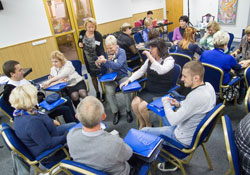Rollout of the Essential training for primary health care workers on the integrated management of hypertension and diabetes in Ukraine

WHO
The first training of trainers for the Essential training for primary health care workers on the integrated management of hypertension and diabetes took place in Kyiv, Ukraine on 17-19 October, 2016 followed by the first cascade trainings for one hundred primary health care (PHC) doctors and nurses on October 20-21.
Strengthening of Primary Health Care capacities
A two-day long Essential Training was developed by national group of experts with the technical support from the World Health Organisation (WHO), and suggested for further implementation in Ukraine. The key purposes of the training implementation included:
- strengthening the capacity of the PHC workers for non-communicable disease (NCD) prevention,
- effective identification of key risk factors, early diagnosis and treatment, and
- improvement of PHC work organization including the important role of nurses in NCD prevention and risk assessment.
NCD Prevention and Health Promotion in Ukraine
The burden of NCDs is a predominant public health challenge in Ukraine, where, according to official statistics, NCDs are estimated to account for 86% of annual deaths.
In order to reduce NCD burden in Ukraine, in line with WHO Global Action Plan for the Prevention and Control of NCDs 2013-2020, the Ministry of Health of Ukraine and WHO initiated the Project «Noncommunicable Diseases (NCDs) Prevention and Health Promotion in Ukraine» (2015-2019). The Project is financially supported by Swiss Agency for Development and Cooperation (SDC). The overall aim of the Project is to improve the wellbeing of people in Ukraine by reducing NCD-related mortality and morbidity with a special focus on CVD-related mortality and morbidity.
There is an ambitious plan to train over 10 000 PHC workers (both doctors and nurses) in seven pilot regions of Ukraine on the essential interventions that will help to prevent, early diagnose and treat NCDs. Technical support has been provided by WHO and its WHO Collaborating Centres on Self Care and NCD Prevention, Health Promotion and Monitoring, and is part of its broader support to countries to assist them in achieving the global goal of a 25% reduction in premature mortality from major NCDs by 2025.
The Deputy Minister of Health Dr. Oleksandr Linchevsky emphasized the importance of the Project for better health and wellbeing in Ukraine at the opening session, “Nowadays it is crucial for health care improvement that practitioners acquire the same knowledge as scientists and academia. We consider continuous education as a key component for positive changes.”
Dr Luigi Migliorini, the WHO Representative in Ukraine added that the “training activities are mainly aimed at experienced professionals, therefore we will share the world best experience for fighting the NCD epidemic in Ukraine.” He also outlined that the implementation of the training package at regional level will impact prevention of NCDs and prolong life expectancy of the population.



